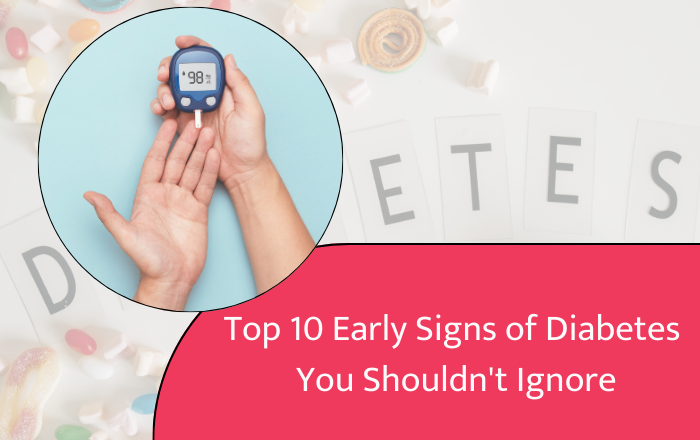Diabetes is becoming one of the most common health issues worldwide. It doesn’t just affect your blood sugar; it impacts your overall health, including your heart, kidneys, nerves, and even vision. While diabetes can seem overwhelming, catching it early can make a big difference in how it’s managed. Many people overlook the subtle warning signs their body gives them, which can lead to complications down the road. This article will walk you through the top 10 early signs of diabetes you should be aware of and what steps you can take to stay ahead of the condition.
What is Diabetes?
Diabetes is a condition where the body either doesn’t produce enough insulin or cannot use it effectively. Insulin is a hormone that helps regulate blood sugar levels, and without it functioning properly, sugar builds up in your bloodstream.
There are two main types:
- Type 1 Diabetes – Often diagnosed in children and young adults, it’s an autoimmune condition where the body attacks insulin-producing cells.
- Type 2 Diabetes – More common in adults, it develops over time due to insulin resistance and lifestyle factors.
- Gestational Diabetes – A temporary condition during pregnancy that increases the risk of developing Type 2 diabetes later.
Understanding the early signs is key to managing diabetes effectively and avoiding complications.
Why Early Detection Matters
Catching diabetes early helps prevent serious complications like nerve damage, kidney problems, or heart disease. Even if the symptoms seem mild, they are your body’s way of signaling that something is wrong. Acting promptly can save you from long-term health issues and improve your quality of life.
The Top 10 Early Signs of Diabetes
1. Frequent Urination (Polyuria)
One of the most noticeable early signs is needing to urinate often, especially at night. This happens because high blood sugar levels force your kidneys to work harder to filter and remove excess sugar from your bloodstream. If you find yourself constantly heading to the bathroom, it might be time to pay attention.
2. Excessive Thirst (Polydipsia)
With frequent urination comes dehydration, leading to constant thirst. Even if you’re drinking plenty of water, your mouth might feel dry. This cycle of thirst and urination is a red flag for high blood sugar levels.
3. Unexplained Weight Loss
Losing weight without trying can seem like a bonus, but it’s often a warning sign of diabetes. When your body can’t use sugar for energy, it starts breaking down fat and muscle instead. If you notice sudden weight loss, it’s worth investigating.
4. Extreme Hunger
People with diabetes often feel hungry even after eating. This is because the body’s cells aren’t getting the energy they need from food due to insulin problems. This constant hunger, paired with other symptoms, could signal diabetes.
5. Fatigue
Feeling tired all the time is another common sign. When your body isn’t able to use sugar properly for energy, it leaves you feeling drained. Fatigue caused by diabetes doesn’t improve with rest, making daily tasks feel exhausting.
6. Blurry Vision
High blood sugar can affect the lenses in your eyes, causing them to swell. This can make your vision blurry. While the effect is often temporary, ignoring it can lead to more severe eye problems like diabetic retinopathy.
7. Slow-Healing Wounds
If cuts, sores, or bruises take a long time to heal, it may be due to high blood sugar levels reducing your blood circulation and impairing your body’s ability to repair itself.
8. Tingling or Numbness in Hands and Feet
This symptom, known as neuropathy, occurs when high blood sugar damages the nerves. It usually starts as a tingling sensation and can progress to pain or numbness. Early detection can help prevent permanent damage.
9. Dark Skin Patches (Acanthosis Nigricans)
Darkened areas of skin, particularly around the neck, armpits, or groin, can be an early sign of insulin resistance. These patches may feel velvety and appear before other symptoms.
10. Recurrent Infections
High sugar levels can weaken your immune system, making you more prone to infections. Yeast infections, urinary tract infections (UTIs), and gum infections are particularly common in people with undiagnosed diabetes.
Who is Most at Risk?
While anyone can develop diabetes, certain factors increase the likelihood:
- Family history of diabetes
- Being overweight or obese
- Sedentary lifestyle
- Poor dietary habits
- High blood pressure or cholesterol levels
- Women with a history of gestational diabetes
If you have any of these risk factors along with the symptoms mentioned, it’s essential to get tested.
When Should You See a Doctor?
If you notice any of the symptoms above, it’s a good idea to schedule a visit with your doctor. Don’t wait for the symptoms to worsen or assume they’ll go away on their own. A simple blood test can provide clarity and help you take control of your health.
Managing Diabetes Effectively
Living with diabetes doesn’t mean life has to stop. With the right approach, it’s possible to lead a full and healthy life. Here are some key steps:
- Adopt a Healthy Diet: Focus on whole foods, lean proteins, healthy fats, and low-glycemic carbohydrates.
- Stay Active: Regular exercise helps lower blood sugar and improves insulin sensitivity.
- Monitor Blood Sugar Levels: Regular testing helps you keep track of your condition.
- Take Prescribed Medications: Follow your doctor’s advice regarding medication or insulin.
Frequently Asked Questions
1. Can diabetes symptoms go unnoticed?
Yes, some people may not experience obvious symptoms, especially in the early stages.
2. How can I prevent diabetes if I am at risk?
Adopting a healthy lifestyle, including a balanced diet and regular exercise, can significantly lower your risk.
3. Is it possible to reverse early-stage diabetes?
For some people with Type 2 diabetes, early lifestyle changes can help achieve remission.
Why Choose Ojas Multispeciality Hospital in Ravet for Diabetes Treatment
At Ojas Multispeciality Hospital, we focus on understanding your unique needs and providing practical solutions. Located in Ravet, our facility is equipped to handle all aspects of diabetes care, from diagnosis to long-term management. Whether you need guidance on lifestyle changes or medical intervention, we’re here to support you.
Take Action Today
Don’t ignore the signs your body is giving you. If you or someone you know is experiencing any of these early symptoms of diabetes, it’s time to take the first step toward better health. Schedule an appointment with Ojas Multispeciality Hospital – Diabetes Treatment in Ravet today and learn how to effectively manage your condition with the right guidance and care.




